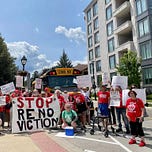The Association of Community Organizations for Reform Now (ACORN) is a non-profit that works with low and moderate-income communities to improve neighbourhood safety, voter registration, healthcare and affordable housing.
ACORN is a national organization with over 183,000 members organized into 31 neighbourhood chapters in 13 cities. ACORN is often best known for its advocacy around housing and tenant rights.
Today, I’m speaking with Olivia O’Connor, head organizer with Hamilton ACORN and Hamilton ACORN member, David Galvin. We’ll be discussing the rental situation in Hamilton as well as the Renovation Licencing and Relocation bylaw intended to stop predatory evictions.
We also discuss alternatives to renting from private for-profit corporations who dominate rental markets across the country. Think renters purchasing the buildings they live in and establishing co-ops.
Here’s a quick overview of how the housing crisis was fuelled by the Ford government and corporate greed.
In an equitable world, renters would not pay more than 30 per cent of their gross annual income for housing. That makes housing ‘affordable’ because it leaves enough money to cover expenses like food, utilities, transportation and other necessities.
Hamilton was once considered an affordable city for renters, but since the Ford government removed rent controls, that is no longer the case.
The Ford government removed rent caps on properties built or renovated after November 15, 2018. That means landlords can increase tenant rents as much as the market will bear on a yearly basis.
Meanwhile, properties covered under the Residential Tenancy Act, 2006 are limited to a 2.5 per cent increase in 2024. And, therein lies the problem.
Landlords will go to extreme lengths to get long time tenants, still covered by rent control, to move out so they can exponentially increase the rent. This is predatory eviction and when achieved under the guise of doing renovations, is called renoviction.
The Canadian Centre for Policy Alternatives published a report by David Macdonald and Ricardo Tranjan called, How much do I need to earn to afford an apartment in my neighbourhood (2023).
The authors determined the hourly wage that a full-time worker would need to make in order to afford a two-bedroom apartment without spending more than 30 per cent of their income on rent.
They called this figure the rental wage and without exception, the rental wage is higher than the minimum wage in every province.
The rental wage for Hamiltonians is $28.77 per hour.
However, most people are working multiple precarious, low paying jobs just to make ends meet. That means anyone earning minimum wage -- $15.50 in 2022 when the research was conducted – would need to work 97 hours a month to be able to pay for a two-bedroom apartment.
Think a one-bedroom would be easier to afford? Currently, a 600 square-foot one-bedroom new build condo rents for between $1,900 and $3,600 plus utilities in Hamilton. Lower priced units could be located in less desirable neighbourhoods, but could just as easily reflect a real estate agent ‘under pricing’ the unit to start a bidding war among applicants. And, there are plenty of applicants.
With minimum wage currently at $16.55 per hour, even the $1,900 condo would require 115 hours of work each month just to cover the rent.
There are only 13,124 subsidized housing units in Hamilton. The wait list for subsidized housing has 6,110 households on it. Then, there is the other list of about 2,000 names waiting for approval to get added to the existing wait list.
In 2022, only 653 households got housed in rent-geared-to-income units. A discouraging number for sure, but it’s down right terrifying when you realize that is the most households since 2017.
Housing is a provincial matter that falls squarely on the shoulders of the Minister of Municipal Affairs and Housing, Paul Calandra, and Premier Ford.
Since Calandra and Ford could reasonably be considered being in dereliction of their duties, Hamilton City Councill took a bold step in January 2024 by passing a Renovation Licensing and Relocation Bylaw to stop predatory evictions. Hamilton ACORN played a pivotal role in convincing councillors and city staff to pass this first-of-its-kind bylaw in Ontario.
Hamilton council also passed a new Safe Apartment Buildings Bylaw along with improvements to the Vital Services and Property Standards Bylaws that will protect renters from landlords purposely neglecting repairs in an effort to force tenants to move.
Federal conservative leader, Pierre Poilievre, has an extremely difficult time comprehending that housing is a provincial issue — making Ontario’s housing crisis Ford’s fault not Prime Minister Justin Trudeau’s. So, let’s throw Poilievre a bone and suggest the federal Liberal’s consider capping the principal residence deduction.
A lifetime cap would protect those who have to move because of work, but would discourage those who flip houses and benefit by not paying capital gains tax on the sale.
Those engaging in the serial flipping of homes, currently receive this tax break and that incentivizes the financialization of homes. Tax the people doing the flipping and there’s less incentive to profit off of this basic human right.
An even bolder step would be to start taxing Real Estate Investment Trusts (REITs). These are companies that own, operate or finance income-producing properties. Most REITs are publicly traded like stocks yet, the federal government helps underwrite their mortgages.
REITs own over 20 per cent of the private rental stock in Canada. Studies reviewed by ACORN indicate that if seven of the largest residential REITs had been taxed similar to non-REIT Canadian corporations since 2010, the result would be an additional $1.2 billion in taxes.
Affordable rental units continue to be lost at a rate 15 times faster than new affordable units are being created. REITs and other financial models incentivize taking affordable units off of the market.
Government tax subsidies and mortgage guarantees are rewarding behaviour that drives up housing costs. Instead, that money would be better spent building affordable housing.
Now, we just have to work on that insider trading that real estate agents take advantage of. You know, having access to the closed bidding process so they can scoop up properties and then flip them for massive profits or turn them into over priced rental properties of their own.
Remember, real estate agents have access to a virtually unlimited pool of buyers, sellers and renters through their colleagues and for decades have been driving housing and rental prices up using bidding wars.
I bought my first home in 1992 and sold that one to buy my second in 1997. Both times I was gaslit by various agents telling me there were multiple bids on homes I wanted so I should up my offer. Turned out there was not. I know because I didn’t take the bate and pulled my offer and the houses did not immediately sell because there were no other offers.
So, let’s end this practice of phantom competitive bidding that drives up housing prices by making bidding open and transparent to all parties involved. Time to level the housing market playing field.
Unfortunately, in order to get provincial policy that guarantees equity in the rental housing market, there has to be political will and for the Ford conservatives that’s not only in short supply, it’s currently on life support.
#ACORN #HousingIsAHumanRight #AffordableHousingNowFord #RentCaps #RentCapsBetweenTenancies
Music: Real Estate by UNIVERSFIELD is licensed under a Attribution 4.0 International License. freemusicarchive.org.
*Be sure to download the Substack app to get the most from your podcast experience.











